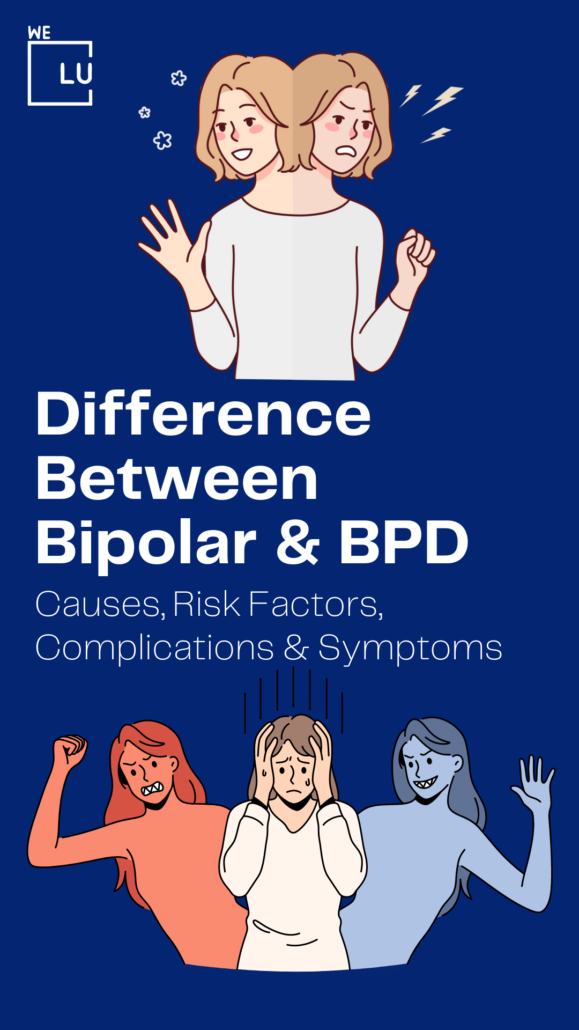We Level Up FL Treatment Center | Editor Yamilla Francese | Clinically Reviewed By Lauren Barry, LMFT, MCAP, QS, Director of Quality Assurance | Editorial Policy | Research Policy | Last Updated: August 7, 2023
Borderline Personality Disorder Quiz
Take the below quiz to see if you have Borderline Personality disorder signs and symptoms. Make sure to answer the questions completely and honestly. Your responses should reflect how you feel now, not how you’d like to feel. Remember, it is never too late to seek help. Commence with We Level Up’s treatment center network “Do I Have Borderline Personality Disorder Quiz.” A mental condition called borderline personality disorder has a significant negative impact on a person’s capacity to control their emotions. Some common behavioral symptoms are:
- Fear of being abandoned.
- Unstable relationships.
- Changing or unclear self-image.
Complete the quiz for Borderline Personality disorder and learn about your specific situation. This brief Borderline Personality Disorder quiz can help determine if you behave in ways that demonstrate a tendency toward Borderline Personality Disorder. While helpful, it is not intended to be a comprehensive diagnosis or to diagnose a specific type of Borderline Personality Disorder. Based on your answers, you may receive a possible indication of Borderline Personality Disorder. If so, we are here and ready to help. Make sure to consult a healthcare professional for a clinical diagnosis. Call us 24/7 for any questions without any obligation ever.
Do I Have Borderline Personality Disorder Quiz?
Take the quiz for Borderline Personality disorder
This quick questionnaire is for those who suspect they may have borderline personality disorder symptoms. It helps determine if you need professional support and additional help. Keep in mind that it's not a definitive tool and doesn't replace a professional diagnosis, but can be useful for tracking your moods and discussing changes with your doctor.
*By taking this free quiz, you may obtain your results online and in your email box. You'll have the opportunity to opt-in to learn more about your symptoms, talk to a mental health consultant and join our newsletter. Rest assured your information is private and confidential. Results, consultations and assessment are provided without any cost to you and without any obligation. If you do not wish to provide your contact information, you may omit it during your quiz. Thank you for opting in and participating. To you best of health.
Borderline Personality Disorder Vs Bipolar Quiz

The following are some crucial distinctions between BPD and bipolar disorder:
- Emotional Instability: BPD is characterized by strong, erratic emotions that frequently cause impulsive conduct and make it difficult to control emotions. Contrarily, Bipolar Disorder is characterized by distinct episodes of mood swings between manic and depressive states.
- Mood Duration and Triggers: BPD mood swings can be frequent and unpredictable, typically brought on by outside factors or a sense of abandonment. On the other side, bipolar disorder mood episodes generally continue longer, from days to weeks or even months.
- Mania and Depression: While BPD lacks identifiable manic periods, bipolar disorder (BPD) does contain phases of mania (elevated mood, increased activity, decreased need for sleep, grandiosity) and depression (prolonged sadness, poor energy, changes in eating or sleep).
- Sense of Self: BPD sufferers frequently deal with identity issues, a persistent sense of emptiness, and an unstable sense of self. These particular identity-related difficulties are uncommon in bipolar disorder.
- Relationship Patterns: BPD is frequently accompanied with issues with sustaining stable and healthy relationships, a fear of being abandoned, and a propensity to act impulsively in order to prevent being abandoned. Not all bipolar disorders include the same kinds of interpersonal relationships.
Although there are clear distinctions between the two disorders, it’s important to note that people can occasionally suffer comorbidity, in which both BPD and bipolar disorder are present at the same time or when overlapping symptoms are noticed. Again, for a precise diagnosis and the best course of therapy, speak with a mental health expert.
Take A Quiz For Borderline Personality Disorder For Adults
A complicated mental health illness known as borderline personality disorder is characterized by pervasive patterns of instability in one’s self-image, emotions, and impulsivity. Some typical BPD symptoms that may be taken into account during an assessment are as follows:
- Intense and Unstable Relationships: Relationships that are intense and turbulent, marked by idealization and devaluation, are frequent for people with BPD. They could struggle to keep steady and healthy connections going because they fear being abandoned.
- Emotional Instability: People who have BPD frequently go through dramatic emotional changes. They might struggle to control their emotions, which would explain their frequent mood swings, impatience, and emotional sensitivity.
- Distorted Self-Image: BPD can be associated with an unstable self-image or identity disturbances. People with BPD may struggle with a sense of emptiness and lack of a clear understanding of who they are.
After completing your Borderline Personality Disorder quiz responses. Press submit and await your results. Share your quiz for Borderline Personality Disorder results with a professional healthcare counselor. If you need help, call the We Level Up treatment center advocates for a free Borderline Personality Disorder evaluation and consultation. There’s never any obligation. Your call is free and private.
Get Help. Get Better. Get Your Life Back.
Searching for Accredited Dual Diagnosis Mental Health Centers Near You?
Even if therapy failed previously, or are in the middle of a difficult crisis, we stand ready to support you. Our trusted behavioral health specialists will not give up on you. When you feel ready or just want someone to speak to about counseling alternatives to change your life call us. Even if we cannot assist you, we will lead you to wherever you can get support. There is no obligation. Call our hotline today.
FREE 24/7 Dual Diagnosis Mental Health Services HotlineImportance Of Borderline Personality Disorder Quiz
It’s crucial to recognize the limitations of quizzes and self-assessments when it comes to diagnosing Borderline Personality Disorder (BPD), even though they can be educational and raise awareness of mental health disorders. Consider these points when evaluating the significance of BPD tests:
- Self-awareness and Education: BPD quizzes might assist people in understanding the signs and symptoms of the condition. They can offer general knowledge on BPD and assist people in identifying certain patterns or behaviors that might call for further assessment.
- Prompting Professional Evaluation: It can be a good place to start if someone has a high BPD quiz score or suspects they could have BPD based on their comments. It might compel people to seek the advice of a mental health expert for a complete evaluation and diagnosis.
- Understanding Common Symptoms: BPD quizzes might list typical signs and events connected to the disorder. This can enable people to have more in-depth conversations with mental health professionals about their own emotions, behaviors, and issues.
- Encouraging Treatment-seeking Behavior: People who take a BPD questionnaire could discover that their experiences match the symptoms of BPD. This knowledge may encourage individuals to seek the right care and assistance, which will result in improved mental health.
However, it’s crucial to recognize the drawbacks of online tests:
- Lack of Diagnostic Accuracy: Tests cannot offer a firm diagnosis of BPD. Only trained specialists in mental health may make a diagnosis after conducting a thorough assessment that takes into account numerous aspects.
- Subjective Self-reporting: Taking quizzes relies on self-reporting, which might be skewed by prejudice or a lack of self-awareness. An assessment that is more thorough and objective is part of a professional review.
- Complexity and Individual Differences: BPD is a complicated condition that manifests differently in each person. It’s possible that quizzes don’t fully capture all possible symptoms or presentational variants.
- Potential for Misinterpretation: Self-administered tests may be interpreted or understood incorrectly, causing false conclusions or unneeded anxiety. It’s crucial to approach quiz findings cautiously and seek expert advice.
In conclusion, BPD tests might be a helpful way to start dialogues about mental health and increase self-awareness. They should be regarded as instructional tools rather than diagnostic ones, nevertheless. For a precise assessment and diagnosis of Borderline Personality Disorder, speak with a licensed mental health professional.

Skip To:
Learn More:
- Do I Have Complex PTSD Quiz Free
- Am I Depressed Quiz Free, Am I Depressed Or Lazy Quiz
- Quiet Borderline Personality Disorder, Symptoms, Treatment & Resources
- Intermittent Explosive Disorder Treatment, Medication & Symptoms
- Bipolar Disorder Symptoms, Causes, Diagnosis, & Treatment
- BPD Treatment, Borderline Personality Disorder (BPD), Causes, Symptoms, Diagnosis
- What is Inattentive ADHD? Types, Symptoms, & Inattentive ADHD Treatment
- ADHD Evaluation For The Right Diagnosis And Treatment
- ADHD in Women. Test & Symptom Checklist for Adults.
- PTSD from Emotional Abuse
World-class, Accredited, 5-Star Reviewed, Effective Mental Health Dual Diagnosis Programs. Complete Integrated Inpatient Rehab with Free Post Discharge Therapy Planning.
CALL (855) 940-6125End the Emotional Pain Rollercoaster. Gain Stability & Happiness Through Recovery Treatment. Start Mental Health Counseling Today. Get Free No-obligation Guidance by Behaviroal Health Specialists Who Understand Mental Health Recovery.
Borderline Personality Disorder Statistics
BPD is best managed with an interprofessional team, including psychiatrists, psychologists, pharmacists, mental health nurses, and social workers. In the United States, recent research has shown that 1.6% of the population has BPD. That number may seem small, but when you consider just how large the United States is, you may realize that 1.6% represents quite a large number of people. Borderline personality disorder is one of the most challenging mental health disorders to manage. [1]
1.4%
It’s estimated that 1.4% of the adult U.S. population experiences BPD.
Source: NCBI
75%
Nearly 75% of people diagnosed with BPD are women.
Source: NCBI
20%
Surveys have estimated the prevalence of borderline personality disorder to be 20% in the inpatient psychiatric population.
Source: NCBI
First-class Facilities & Amenities
World-class High-Quality Mental Health Services & Behavioral Health Substance Abuse Treatment
Rehab Centers TourRenowned Mental Health Centers. Serene Private Facilities. Inpatient Rehab Programs Vary.
Mental Health Helpline (855) 940-6125Proven recovery success experience, backed by a Team w/ History of:
15+
Years of Unified Experience
100s
5-Star Reviews Across Our Centers
10K
Recovery Successes
- Comprehensive Dual-Diagnosis Treatment
- Complimentary Family & Alumni Programs
- Coaching, Recovery & Development Events
- Comfortable Onsite Medical Detox Center
Borderline Personality Disorder
Facts Sheet
Individual talk therapy may successfully treat BPD. In addition, group therapy and books about borderline personality disorder can sometimes be helpful. Medications have less of a role in the treatment of BPD. But in some cases, they can improve mood swings and treat depression or other disorders that may occur with this condition.
BPD Treatment
BPD was once thought untreatable. However, this isn’t the case, and we now know there are effective treatments for BPD. Many people with BPD find relief from distress through therapy.
Dialectical Behavioral Therapy
Dialectical behavioral therapy (DBT) was developed by psychologist Marsha Linehan. This form of therapy teaches you to live and cope with difficult and overwhelming emotions. DBT is the most common form of treatment for BPD. Each skill set helps alleviate symptoms associated with BPD.
Dialectical behavioral therapy teaches you four main skill sets:
- Interpersonal effectiveness
- Emotional regulation
- Distress tolerance
- Mindfulness
Mentalization-Based Therapy
Mentalization-based therapy helps you develop an awareness of your inner state. Another significant focus of mentalization-based therapy is developing empathy for other peoples’ experiences.
Research in 2018 suggests that this therapy could significantly reduce the severity of BPD symptoms and the severity of co-existing conditions and improve quality of life. The authors note that more research is still needed, though.
Medication
No single medication is effective for BPD, but medications may relieve some symptoms.
For example, medications may help with mood stabilization. If you think medication might help you, consider talking with a doctor about your symptoms.

When to Contact a Medical Professional
See your provider if you or someone you know has symptoms of borderline personality disorder. It is especially important to seek help immediately if you or someone you know is having thoughts of suicide.
You can also call 911 or the local emergency number or go to the hospital emergency room. DO NOT delay.
If someone you know has attempted suicide, call 911 or the local emergency number immediately. DO NOT leave the person alone, even after you have called for help.
[2] Source: Borderline personality disorder – U.S. Department of Health and Human Services National Institutes of Health

End the Emotional Pain. Get Your Life Back.
Feeling Depressed, Anxious or Struggling with Mental Health Illness? Get Safe Comfortable Mental Health Dual Diagnosis High-Quality Therapy From Counselors That Care. Begin Your Recovery Now.
Hotline (855) 940-6125How to Improve Mental Health? 8 Steps & Tips for Maintaining Your Mental Wellbeing Video
8 Steps for Mental Wellbeing & How To Improve Mental Health In The Workplace
- Staying Positive
- Practicing Gratitude
- Taking Care of Your Physical Health
- Connecting With Others
- Developing a Sense of Meaning and Purpose in Life
- Developing Coping Skills
- Meditation
- Relaxation Techniques
Experience Transformative Recovery at the We Level Up Treatment Center.
See our authentic success stories. Get inspired. Get the help you deserve.



Start a New Life
Begin with a free call to a behavioral health treatment advisor. Learn more about our dual-diagnosis programs. The We Level Up treatment center network delivers recovery programs that vary by each treatment facility. Call to learn more.
- Personalized Care
- Caring Accountable Staff
- World-class Amenities
- Licensed & Accredited
- Renowned w/ 5-Star Reviews
We’ll Call You
Search We Level Up FL Borderline Personality Disorder Quiz & Mental Health Topics & Resources
Sources
[1-2] Ripoll LH. Psychopharmacologic treatment of borderline personality disorder. Dialogues Clin Neurosci. 2013 Jun;15(2):213-24. DOI: 10.31887/DCNS.2013.15.2/lripoll. PMID: 24174895; PMCID: PMC3811092.
[3] Borderline personality disorder – U.S. Department of Health and Human Services National Institutes of Health
[4] 18 Signs You Grew Up With ‘Quiet Borderline Personality Disorder’ – The Mighty Available from: https://themighty.com/topic/borderline-personality-disorder/quiet-borderline-personality-disorder-bpd-signs-child/
[5] National Collaborating Centre for Mental Health (UK). Borderline Personality Disorder: Treatment and Management. Leicester (UK): British Psychological Society (UK); 2009. (NICE Clinical Guidelines, No. 78.) 2, BORDERLINE PERSONALITY DISORDER. Available from: https://www.ncbi.nlm.nih.gov/books/NBK55415/
[6] Borderline Personality Disorder – National Institute of Mental Health (NIMH)
[7] Subbarao BS, Silverman A, Eapen BC. Seizure Medications. [Updated 2022 Jul 11]. In: StatPearls [Internet]. Treasure Island (FL): StatPearls Publishing; 2022 Jan-. Available from: https://www.ncbi.nlm.nih.gov/books/NBK482269/
[8] Bandelow B, Michaelis S, Wedekind D. Treatment of anxiety disorders. Dialogues Clin Neurosci. 2017 Jun;19(2):93-107. DOI: 10.31887/DCNS.2017.19.2/bbandelow. PMID: 28867934; PMCID: PMC5573566.
[9] Olabi B, Hall J. Borderline personality disorder: current drug treatments and prospects. Ther Adv Chronic Dis. 2010 Mar;1(2):59-66. DOI: 10.1177/2040622310368455. PMID: 23251729; PMCID: PMC3513859.
[10] Borderline Personality Disorder – MentalHealth.gov U.S. Department of Health & Human Services